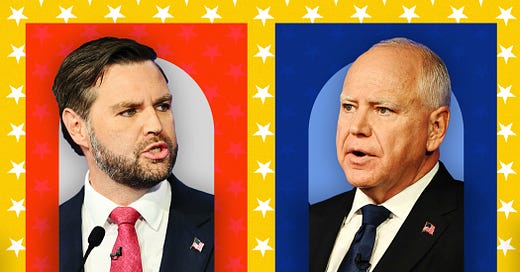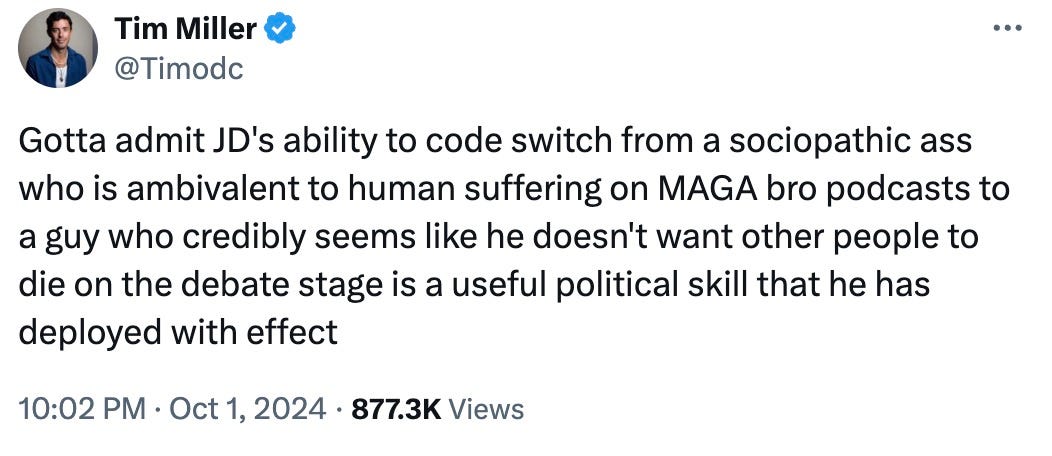Veni, Vidi, Vance-i?
Vance’s achievement isn’t that he won the debate. It’s that he may have made Trump more palatable.
A key shipping-industry strike. An Iranian ballistic attack on Israel. And, of course, a vice presidential debate—perhaps the last tentpole item of the presidential cycle.
Is it just us, or is the news accelerating? Thirty-three days to election day. Happy Wednesday.
Hillbilly Renaissance
—William Kristol
It’s usually not a good night when your allies try to assure everyone, “Don’t worry, vice presidential debates don’t matter.”
It’s true that they usually don’t. And this one probably won’t either. So those reassuring types who popped up all over the place last night aren’t necessarily wrong. Still, let’s be honest: Last night’s debate was dispiriting. And it could ultimately matter some.
Tim Walz warned Kamala Harris before she chose him as her running mate that he wasn’t a very good debater. He was right. That doesn’t mean he’s not a nice man. It doesn’t mean that he wouldn’t be a good vice president.
What it does mean, however, is he that didn’t do much last night to help the Harris-Walz ticket.
Walz’s best two moments were on abortion rights and January 6th, where he pressed home the arguments against Donald Trump fairly effectively. But not as effectively as Harris herself had done three weeks ago, or as others have done on the campaign trail. Otherwise, Walz’s answers were mostly unexceptionable, or in some cases poor (including on Iran and on his misstatement of when he was in China).
Nor did Walz do much to respond to some of JD Vance’s attacks on Harris (for example, his repeated assertion that, as vice president, her administration has not done the very things she’s now promising).
Nor did he do much to rebut or debunk—he didn’t even really challenge—Vance’s effort to sell to the American people a kinder and gentler MAGA. At the end of the day, Trump being Trump will limit the success of this effort. But even a little success in the attempt to make a second Trump term seem less alarming could make a difference.
After all, if you’re a normie Republican, wavering between deserting Trump and sticking with him, you could watch Vance last night and tell yourself:
Gee, this guy is intelligent and pretty reasonable. He’s not as mean or extreme as they’ve been saying. He’ll be there by Trump’s side calming him down and moderating the craziness. I don’t have to follow Liz Cheney into supporting Harris, or even Mike Pence into staying home. I’m kind of reassured.
It’s not clear how many voters there are in this category, or how much Vance may affect their votes. But consider the tone of the debate coverage. The debate between Vance and Walz was “mostly cordial,” a “civil affair” featuring “more policy, fewer zingers” in which they “agreed to disagree?” Both candidates saw their approval ratings improve, according to the instant polls.
It’s obviously hard to object to a little more warmth and cordiality in our politics. But I for one would have appreciated a little less Minnesota Nice and a little more Minnesota Fats, a little less high school teacher and coach and a little more pool shark and hustler.
But maybe that’s just me.
As for Vance, Jonathan Last is surely right that he sought to help himself more than he sought to help Trump. On the other hand, in helping himself, Vance probably did help Trump a little in a way that instant polls showing the debate a tie don’t capture. A couple of weeks ago the selection of Vance seemed to be making the prospect of a second Trump term even more dangerous. Vance did a good job of reversing course last night. And Walz, by conceding so much to Vance’s reasonableness, may have undercut a bit the ability to really sound the alarm about Trumpism, and the threat it poses to democracy at home and freedom abroad
Trump will continue to be Trump. That will help. But as Walz and Vance return to the shadows of a vice presidential campaign, the lingering question from the debate is this: Are some swing voters who were very worried about the prospect of a Trump-Vance administration now a bit more comfortable with that prospect?
I’m worried they might be.
The Fight They’d Actually Prepared For
—Will Selber
Two days ago, Israel began its first ground invasion of Lebanon since 2006 to push Hezbollah away from its border. Yesterday, Iran, Hezbollah’s sponsor, retaliated with a massive barrage of missiles, many of which penetrated Israel’s missile defense system. This is Israel’s second front in less than a year—fighting is still ongoing in Gaza. But this isn’t a repeat of the Gaza operation—not by a long shot.
Israel has been preparing for its war with Hezbollah for months, if not years. That much was clear when I met with representatives of the IDF and Israeli intelligence community in Northern Israel this past summer. Traveling near the Israel-Lebanon border, it wasn’t hard to tell that things were on edge. The most obvious indicator was the 60,000 people displaced from their homes because of intermittent Hezbollah attacks. But that’s not to say the other signs were subtle. The car rental salesman advised me, “Once you get past Haifa, all GPS is down.”
Using an old-fashioned paper map to make my way through the sun-baked, mid-summer foothills of the Golan, I eventually found my way to the Alma Research Center, a think tank dedicated solely to Israel’s security challenges along its northern border, where I was meeting with some open-source analysts studying Hezbollah.
In a way, the Israelis’ deep expertise about Hezbollah partially explains the monumental intelligence failure regarding Hamas on October 7th. The Israelis took Hezbollah seriously, but not Hamas. That was a mistake. All of the Israeli intelligence services—Mossad, Shin Bit, Amman, Unit 8200—failed spectacularly on October 7th. They know it—senior leaders have resigned from all of the country’s security services.
Part of the reason Israel’s military operation in Gaza has been so slow, bloody, and frustrating is that the IDF was preparing to fight Hezbollah, not Hamas. They were preparing for the hills and villages of southern Lebanon, not the unprecedented network of tunnels and dense urban streets and towers of Gaza. But for nearly a year, while Gaza burned and Sinwar hid and hostages died, the threat in the north remained—and it was always a larger threat.
Now, the IDF and the Israeli intelligence community can turn their attention to the threat they’ve been training against. Although none of the research analysts at Alma Research Institute would say so openly, I felt assured that the Israelis were prepared to inflict severe pain on Hezbollah. And then maybe the people of northern Israel—and southern Lebanon—can go home.
Quick Hits
TRUMP’S OIL SWING: After bashing Vice President Kamala Harris for fundraising instead of attending to hurricane duties, Donald Trump today heads to Texas today to tap a gusher of oil money.
The former president begins the fundraising trip in Midland, the heart of oil country, followed by a stop in Houston, the city that black gold built. Trump, who last raised $40 million in a Texas fundraising swing in May, hopes for a repeat to blunt Harris’s significant cash advantage.
Trump campaign sources familiar with the fundraising effort said they see no disconnect between his cash dash and hers because she was raising money in California over the weekend while flooding and landslides from Hurricane Helene devastated North Carolina.
“All she cared about was her San Francisco donors were making it rain,” said a source who was not authorized to speak on the record.
Nor is Trump world worried about the prospect of pumping oil money into the campaign when fossil fuel use is a major source of man-made climate change that likely made Hurricane Helene either stronger or both.
“We all use fossil fuels. Get over it,” the source said.
—Marc Caputo
THE NUMBERS GUY: Donald Trump likes to behave as though the world was perfectly tranquil during his leadership. So when a reporter asked him at a Milwaukee press conference last night if he wished he’d responded more powerfully to a 2020 Iranian attack that left more than 100 U.S. soldiers in Iraq with traumatic brain injuries, he bristled at the question.
“First of all, ‘injured’—what does ‘injured’ mean?” Trump replied. “‘Injured’ means you mean because they had a headache? Because the bombs never hit the fort.”
It wasn’t even the first time that Trump had downplayed these particular injuries.“I heard they had headaches and a couple of other things, but I would say, and I can report, it is not very serious,” he said shortly after the 2020 attack.
You might think a politician—even a psychopathic one just operating from his own self-interest—would be reluctant to publicly pooh-pooh injuries to wounded soldiers. Trump apparently thinks otherwise.
MIDWEST UNIRONICALLY NICE: Last night’s undercard debate diverged significantly from the presidential in many respects. But the most notable may be this: The candidates’ many rhetorical gestures toward one another’s basic sincerity and good faith in their approaches to specific issues.
When the debate turned to reproductive rights, Vance spoke about the women he grew up around who saw abortion as their only chance to escape terrible lives. Walz responded not by attacking Vance’s sincerity, but by driving a wedge between him and his running mate: “I agree with a lot of what Sen. Vance was saying. His running mate, though, does not.”
An exchange on gun safety also featured both Walz and Vance acknowledging the other at least wanted to solve the problem. Walz mentioned that his own son had witnessed a shooting at a community center and spoke of his experiences talking to parents of kids killed at Sandy Hook. “I 100 percent believe that Sen. Vance hates it when these kids—it’s abhorrent and it breaks your heart. I agree with that,” Walz said. “But that’s not far enough when we know there are things that work.”
Vance’s reply started like this: “Tim, first of all, I didn’t know that your 17-year-old witnessed a shooting, and I’m sorry about that and I hope he’s doing okay. Christ have mercy. It is awful.”
“I appreciate you saying so,” Walz said.
It’s amazing how much more human a debate can be when you administer one small tweak: Trump isn’t on the stage.
‘I’M FOCUSED ON THE FUTURE’: Don’t miss Will Saletan, up on the site today, about “the one question that mattered” in last night’s debate—Vance’s refusal to say that Donald Trump lost the 2020 election:
In a second Trump administration, Vance’s opinions about tariffs, abortion, health care, and other issues probably wouldn’t matter. Trump would make those calls. But when the time comes to certify an election, Vance’s opinions and decisions would be crucial. He believes that he and Trump could push constitutional boundaries to overturn the results . . . That moment tells you the most important thing about Vance: When democracy is in peril, he will bow to Trump, not to the people or the Constitution. He must never be given that chance.











Vance last night was like the guy who beats up his wife and then when the police come to the door he's all sweet reason and gosh officers whatever you need to set your minds at rest.
People will buy it. At least, I know people who will buy it. With any luck they will also forget about it pretty quickly. Harris and Walz both could help *make* that luck by doing more interviews and just making themselves available across more different channels.
It happened and it's real. The way you show confidence in and respect for people (including yourself) is by acknowledging their flaws. Everybody has flaws; denying them just makes them seem worse than they are. Walz knew he sucked at debating and I think we can safely respect his judgment on that. Now he can get on with doing the things he's good at.
Walz's only standout moment was "damning non-answer"
JD Vance on the other hand
-conceeded that the current abortion laws killed women and "ruined lives", and then recomitted to the state by state policy
-repeatedly taked about his mother's addiction totally unprompted
-explained to America that Ohio "gets pretty cold in winter" in his CLOSING statement
-repeatedly referred to the moderators by their first name's in a way reminiscent of an 16 year old who just read "How to Win Friends and Influence People"
-had no actual accomplishements to tout
-repeatedly dodged questions, even when the questions were expllicitily redirected to him by Walz or the moderators
JD Vance did not have a good debate. To paraphrase Tolkien, he looked fairer, but felt fouler.